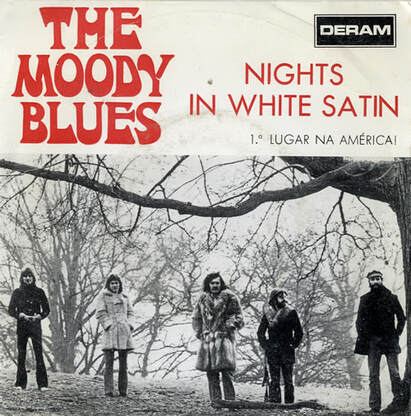
Way back when the world was young (and so was I), in 1962, there was a company called Bradmatic. Bradmatic was based in Birmingham, UK, and they developed this thing called a Mellotron. Originally, the Mellotron was seen as a way to store and retrieve sound effects but was quickly adapted for use as a musical instrument.
With the Mellotron, we have a piano-style keyboard. Each key is attached to a strip of magnetic tape, like they used to use to record sounds and music. (We’re talking pre-digital, remember.) Each piece of tape could have three different sounds recorded on it, and you could select which of the three by turning a knob. If you pressed one key you might get the sound of a barking dog, another the sound of retreating footsteps—that kind of thing.
Then, someone got the idea to record musical instruments playing each note, and the Mellotron was born! (How does this relate to “Nights in White Satin?” Patience, young grasshopper, all will be made clear.)
We move forward in time to 1967. One of the people who worked at the Bradmatic factory was a young man named Mike Pinder. Mike, in fact, set up his own Mellotron with the instrumentation that he wanted. Mike was the keyboardist for an R&B band called The Moody Blues. They had put out an album with one small hit in the UK, but the rest of the songs, mostly covers of other bands’ songs, really hadn’t gone anywhere. The lead singer/guitarist left to go do other things.

One night, sitting on some new sheets, Justin was thinking about his previous love and the breakup and the new relationship he was starting. He pulled out his 12-string guitar and quickly wrote the song “Nights in White Satin.”
The next day, he took the song to the band and played through it. They were not impressed. Then, Mike Pinder asked Justin to play it again, this time adding an accompaniment on the Mellotron. Magic happened.
The band had gotten an advance from their record company, Decca, and Decca wanted results. The company had recently put out their own version of stereo equipment. Thus far, this was only popular among the classical music lovers. Decca wanted to bring in a new audience. So, they called in The Moody Blues and told them that they were going to record Dvorak’s 9th Symphony. The idea was that the band would record a rock version of each movement, and then an actual orchestra would record the movement as Dvorak had written it. The boys in the band smiled, nodded their heads, went to a pub,and decided to record their own music. They still wanted the orchestra, though.
The boys contacted Peter Knight, the conductor of the London Festival Orchestra who was supposed to be recording Dvorak. Instead, for five days, he would get the tracks that the band had recorded that day, write and arrange the music for the orchestra, and then record. The only time that the orchestra and the band were in the same studio was for the song “Nights in White Satin.”
Decca executives were impatiently awaiting their Dvorak album. When they heard what had been recorded, they were not amused. One voice from the wilderness of the US liked what he heard. FM radio was starting to become popular, particularly among the college crowd. It took years, but by 1972, “Nights in White Satin” was #5 in the US. The album remained on the Billboard charts for over two years.
Days of Future Passed, the album that gave us “Nights in White Satin” is generally considered to be the beginning of the prog, or progressive, rock movement. The Mellotron became the instrument of choice for many early bands, like King Crimson and Genesis. The Beatles recorded “Strawberry Fields” using the instrument, even though their producer, George Martin, hated it, saying that it “was as if a Neanderthal piano had impregnated an electronic keyboard.” They continued to use it on The White Album and Magical Mystery Tour.
Eventually, the Mellotron was put aside as synthesizers were able to do more and more. Production of the Mellotron stopped in 1986. But by the 1990s, bands were recording with what older models they could find. In 2007, production of a new model began.
The other movement that began as a result of Days of Future Passedwas the use of classical instruments in rock. Now, we are not even aware of the rich orchestrations that can accompany our favorite pop/rock act. Joining The Moody Blues in playing with a full orchestra have been: (to name only a very few) S&M (Symphony and Metallica) in 1999, Symphonic Livewith Yes in 2001, and even KISS in 2003.
What are your feelings on the combination of rock and classical? Is it a good thing or a bad thing? I’ll be playing some of Days of Future Passedas well as some other rock/symphony pairings this week on my Minnich Music Facebook page, so please be sure to check them out.
Until next time!

 RSS Feed
RSS Feed